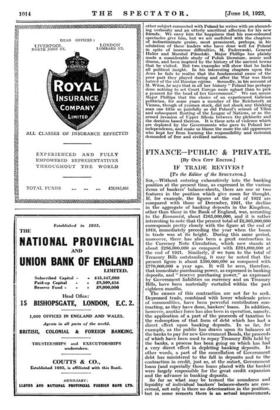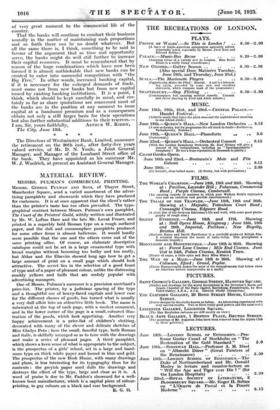FINANCE-PUBLIC & PRIVATE.
[By OUR CFTY EDITOR.]
IF TRADE REVIVES ?
[To the Editor of the SPECTATOR-1 SIR.—Without entering exhaustively into the banking position at the present time, as expressed in the various items of bankers' balance-sheets, there are one or two features in the position which give room for thought. If, for example, the figures at the end of 1922 are compared with those of December, 1921, the decline in the aggregate of banking deposits in the Kingdom, other than those in the Bank of England, was, according to the Economist, about £165,000,000, and it is rather interesting to note that the present total of £2,363,000,000 corresponds pretty closely with the figure at the end of 1919, immediately preceding the year when the boom in trade was at its height. During this same period, moreover, there has also been a great contraction in the Currency Note Circulation, which now stands at about £286,000,000 as compared with £324,000,000 at the end of 1921. Similarly, if we turn to the total of Treasury Bills outstanding, it may be noted that the present figure is about £590,000,000 as compared with £770,000,000 a year ago. It will be seen, therefore, that immediate purchasing power, as expressed in banking deposits, and " reserve purchasing power," as expressed by Government liabilities on currency and on Treasury Bills, have been materially curtailed within the past eighteen months. The causes of this contraction are not far to seek. Depressed trade, combined with lower wholesale prices of commodities, have been powerful contributors con- tracting, as they have done, bankers' loans. In addition, however, another force has also been in operation, namely, the application of a part of the proceeds of taxation to the redemption of that form of debt which has had a direct effect upon banking deposits. In so far, for example, as the public has drawn upon its balances at the banks to pay for new Government Bonds, the proceeds of which have been used to repay Treasury Bills held by the banks, a process has been going on which has had a very direct effect in depleting banking deposits. In other words, a part of the cancellation of Government debt has ministered to the fall in deposits and to the contraction in credit, just as, at the outset, Government loans (and especially those loans placed with the banks) were largely responsible for the great credit expansion and the advance in banking deposits. So far as what may be termed the soundness and liquidity of individual bankers' balance-sheets are con- cerned, not only is there no deterioration in the position, but in some resr■ects there is an actual improvement. By the great advance which has taken place in prices of securities not only have the banks been able to strengthen inner reserves as well as to meet bad debts arising out of stagnant trade, but long-dated Government obligations have been sold at a profit and shorter dated securities bought in their place, so that in those respects the banks have not only made profits on their investments, but have in a general way increased their liquidity. Nevertheless, the fact remains that in two directions at least the immediately available resources for any trade expansion would seem to have suffered diminution. In the first place, there is the actual large contraction in deposits already referred to, and in the second place, the holding of Treasury Bills by the banks must be fully £100,000,000 less than a year or eighteen months ago, which means, of course, that the banks are no longer in a position to supplement their lending power by the easy process of simply letting these bills run off.
It is pertinent, therefore, to raise the question of whether, in the event of any important trade revival, any rise in money rates would be immediately caused on a scale likely to check automatically, or at all events restrain, the revival. We know, for example, that at the end of 1919, when deposits were somewhere at about the present level, trade demands for accommodation were taxing bankers' resources, although at that time speculative operations on the Stock Exchange were virtually non-existent.
To-day, the position has so far changed that wholesale prices of commodities are at a very much lower level than was the case .in 1919, the *Economist index Number, for example, at the end of April being 4440 as compared with 7864 at the end of 1919. On the other hand, not only has the curve in prices tended upward again during the greater part of this year, but the stub- bornness with which retail prices have been maintained is an important factor in the situation. If, therefore— and the possibility has, at all events, to be borne in mind—a revival in trade should occasion a renewal of the rise in commodity prices, the effect might easily be to occasion at least a partial reversion to the conditions which prevailed in 1920, when the demands for loans were on a scale to involve a high Bank Rate.
Nor in this connexion is it possible to forget that the tenets of the Labour Unions are all in the direction of keeping up costs of production well above the pre-War level. Without entering into either economic or ethical considerations with regard to the matter, it is a point which must have a very direct connexion with our ability to finance any important trade revival out of our banking resources, especially if in the meantime there should be some further diminution in those resources as a result of what is sometimes described as the defla- tionary process. Of course, I am aware that both as regards commodity prices and the tendency of money rates (in the event of any trade revival) some authorities take a different view, and among others Mr. A. H. Gibson, the well-known statistician, has recently given a number of reasons for believing that commodity prices in the course of a few years' time will not be higher than the pre-War level. Moreover, as regards the prospects of money rates hardening in the event of a revival in trade, Mr. Gibson also considers that the position would be materially eased by the fact that a revival in trade would in itself liquidate a large amount of bank and commercial credit at present frozen in traders' book debts and stock. The probabilities are, he maintains in an article which appeared some time since in the Bankers' Magazine, " that there will be more money and credit available at the time when it is actually required for new and safe transactions." It may be so, but, on the other hand, it is well to remember that given the re-establishment of real conditions of peace in Europe, the revival in International trade, if gradual, should ultimately reach large propor- tions, and the extent to which our banks have now concerned themselves with enterprises extending to so many pasts of the world seems to make this question of the abundance of their lending resources a matter (Continued on page 1016.) of very great moment to the commercial life of the country. That the banks will continue to conduct their business soundly in the matter of maintaining cash proportions and so forth there can be no doubt whatever. But all the same there is, I think, something to be said in favour of the argument that as time and opportunity serve, the banks might do well still further to increase their capital resources. It must be remembered that by reason of the huge combinations which have now been formed it is almost unthinkable that new banks can be created to enter into successful competition with "the Big Five." In other words, increased banking capital, if it is necessary for the enlarged demands of trade, must come not from new banks but from new capital issued by existing banking institutions. It is a point, I think, which should be kept carefully in mind, and cer- tainly so far as share quotations are concerned most of the banks arc in the position at any moment to issue capital at a handsome premium and as a consequence obtain not only a still larger basis for their operations but also further substantial additions to their reserves.- The Directors of Westminster Bank, Limited, announce the retirement on the 80th inst., after forty-five years valued service, of Mr. D. N. Youle, a Joint General Manager, and Manager _ of the Lombard Street office of the bank. They have appointed as his successor Mr. W. J. Woolrich, at present an Assistant General Manager.








































 Previous page
Previous page